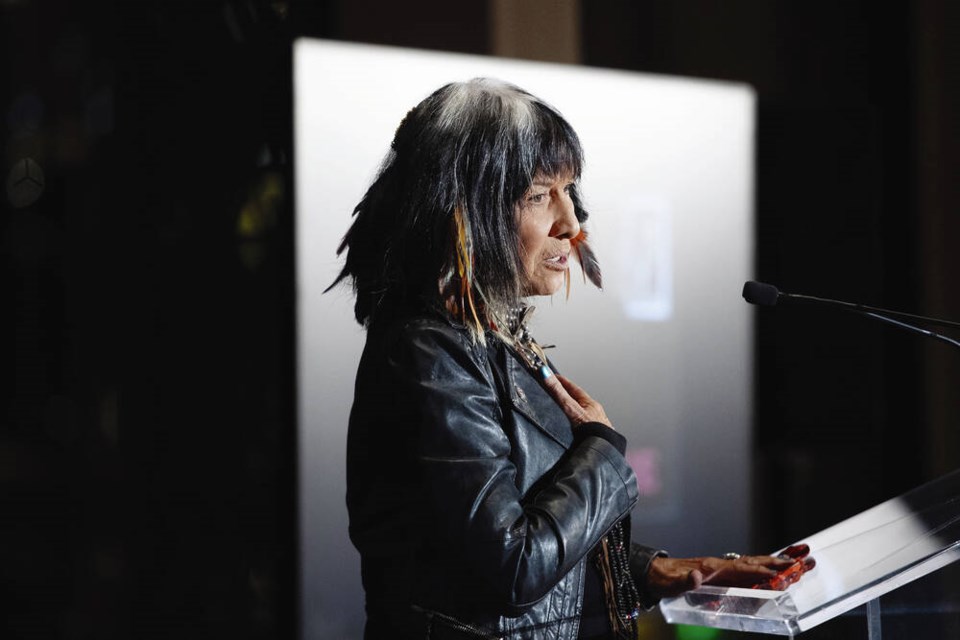CBC-TV’s recent Fifth Estate report raising questions about Buffy Sainte-Marie’s Indigeneity has rocked our country and become the topic of conversation among many.
Social-media posts and replies are still going strong, with Canadians divided in their reaction.
Some don’t support the CBC reporting and stand with Sainte-Marie, recognizing her as an Indigenous woman.
Others are convinced the investigative report uncovered the truth.
There are also people who believe the report to be true, but argue that with Sainte-Marie in her early 80s, “Why bring it up?”
I’ve never been one for a witch hunt. When I first saw the headline, I didn’t believe it — I thought it was just another sensational piece, grasping at straws to cancel someone.
I’ve watched the episode three times. The first time I was in shock for two reasons.
One, I have met Sainte-Marie and attended a presentation where she shared her story. I deeply connected with her as a fellow product of the 60s Scoop.
The second reason is that she is a Canadian icon, a trusted face, who has received many awards and accolades and was viewed as an Indigenous leader. She was also deemed the first Indigenous person to win an Oscar.
When I was younger, I didn’t know about the 60s Scoop. I felt displaced as an Indigenous person with no idea where I was from.
People would ask me about my heritage and what First Nation I was from, and I didn’t know. When I learned about the 60s Scoop and the tens of thousands of people just like me in this country, I didn’t feel so alone.
So when Sainte-Marie shared her story, I could see myself in her. I looked up to her as a role model, and someone who could understand my life experiences. It’s hard to hear that that might not be true.
Some feel that since she was adopted by an Indigenous family as an adult, she should be seen as Indigenous.
For me, I accept that that is between her and that family and community, and it’s not my place to pass judgment. I am not discrediting her connection to the family and community, and her relationships with them.
The troubling and triggering part of this for me is the 60s Scoop reference.
Firstly, I believe the Fifth Estate report and commend Geoff Leo on his reporting. Her family was interviewed and shared their truths and documents, including her birth certificate signed by the doctor who delivered her to her non-Indigenous parents.
I know that each situation is different. Sainte-Marie’s legal response notes that sealed records and birth certificates have adopted parents’ names on them, which I know is a real experience.
My birth certificate has my adopted parents’ names on it — nowhere were my birth parents listed.
My adoption was a private Mormon adoption arranged moments after my surprise birth. I had to wait until I was an adult and laws changed to get my records open, and even then, there was no reference to my Indigenous roots.
In family records about my birth, the space for the doctor’s name is left blank, the time of birth is left blank, and most other information is missing.
If you interviewed my family, they would let you know I was adopted. When I was a teen, friends would meet my family and ask: “Are you adopted?” It couldn’t have been a secret, even if I wanted it to be.
In the past few years, I’ve learned who my birth families are, their Indigenous roots and lineage. I’ve been recognized by the Canadian government as a product of the 60s Scoop, with a letter acknowledging that this affected my culture, language and connections.
Hearing the stories of Sainte-Marie and other high-profile alleged Pretendians is more deeply triggering and personal than just being let down by an icon, teacher or author.
As a product of the 60s Scoop, I’ve gained a perspective and outlook on things that has helped me to be a better mother, a better friend and a better businesswoman than I might have been otherwise.
I am not dwelling on my life experience, but it doesn’t seem right for others to appropriate the 60s Scoop for personal gain, without understanding the heartbreak, struggle and identity issues that come from being culturally displaced.
Charla Huber is an Indigenous communications consultant based in the capital region. Her family is from Beausoleil First Nation and Fort Chipewyan.



